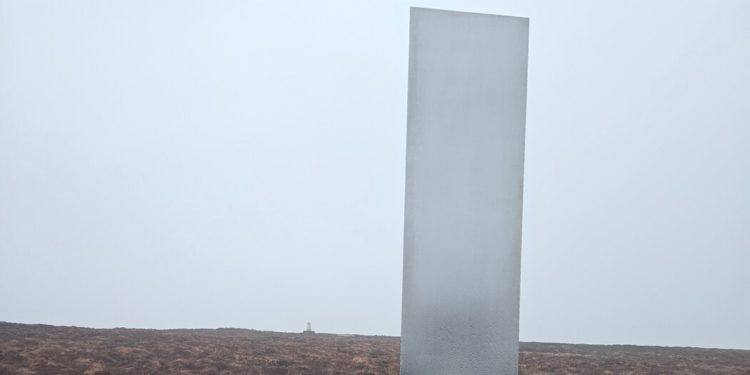By THE NEW YORK TIMES
Not one to let “horrific” weather stop him, Craig Muir left his house in Hay-on-Wye in Powys, Wales, early Tuesday to take his usual walk up Hay Bluff when he spotted something large, shiny and new.
Standing there in the distance, like a beacon, was a silver monolith with no apparent trace as to how it got there or what it was doing in that spot.
It looked like it had “just been dropped down from space,” Mr. Muir said during a telephone interview on Tuesday. The sighting immediately captured media attention, calling to mind similar mysterious objects placed around the world in late 2020.
“It must be some sort of art installation,” he said. “If you didn’t know anything, to look at it, you could have easily thought it had been dropped off by a U.F.O. or something.”
Describing the location of the monolith as “the middle of nowhere,” Mr. Muir said there were no visible tracks, but he did see some footprints.
“I don’t know if someone else had seen it,” he said.
Mr. Muir, 37, who works as a stone mason, said the monolith stands roughly 10 feet tall, and that it’s about a foot-and-a-half wide at each point. He said that he didn’t know how deep into the ground it goes.
Calling it a “perfect monolith,” Mr. Muir said it was “exactly like the ones they have in Egypt” but “made of steel, and there’s no markings on there at all.”
The monolith appears to have been made from surgical steel, he said, adding that he did not think it was aluminum because “it had too much shine to it.”
“I’d say it was like a surgical steel because obviously whoever’s done it doesn’t want it to rust,” Mr. Muir said, noting that the monolith must have some heft to it because it wasn’t moving at all despite the strong winds. He also described it as “very, very smooth, very shiny, very crisp edges.”
As someone with welders and metal fabricators in his family, Mr. Muir said he’s around metal a lot, and it was his professional opinion that whoever crafted it did a “real good job.”
“There’s no obvious weld marks,” he said. “It was very, very neat.”
Mr. Muir was apparently not the only person to see it. Richard Haynes, who spoke to WalesOnline, said he had spotted the object while running on Hay Bluff.
“I thought it looked a bit bizarre and might be a scientific media research thing collecting rainwater,” he said.
The Welsh monolith is only the latest of these objects to suddenly, almost magically, appear.
For a time — a few weird months in the depths of the pandemic — things like the one in Wales seemed to be popping up everywhere. A bighorn sheep survey in Utah spotted the first, in November 2020 in a remote canyon in Red Rock Country. Even though that one was dismantled under the cover of night a few days later, others were soon built in California, Romania and Turkey.
People widely called them monoliths, because they were large and sheer and appeared in surprising places, like the thing in “2001: A Space Odyssey,” albeit without as much of an aura of mystery and dread. In a few cases, people took credit for their creation. Some other people sought them out, seeking a strange metaphysical experience to rival those in the film. Mostly, though, people took cellphone photos and made internet jokes.
Hay Bluff, which overlooks the town of Hay-on-Wye, is a hill located inside of Brecon Beacons National Park, Mr. Muir said. Unfortunately, it’s this setting that could do away with the monolith sooner rather than later.
“I can’t say how long it will be there, to be honest,” he said. “Knowing our national parks, they don’t take lightly to things being installed without their permission.”
Alan Yuhas contributed reporting and Susan C. Beachy provided research.







Discussion about this post